MOMCILO KRAJISNIK SENTENCED TO 27 YEARS
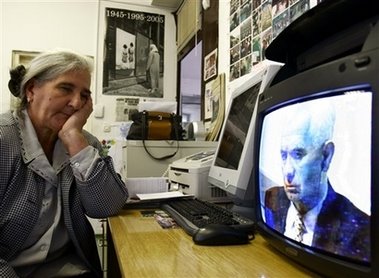 Bosniak woman Munira Subasic watches on TV the verdict on Momcilio Krajisnik, a former high-ranking Bosnian Serb politician accused of genocide over the brutal campaign of ethnic cleansing during the 1992-95 war in Bosnia, at the Union of Srebrenica woman in Sarajevo on Wednesday, Sept. 27, 2006. The U.N. tribunal sentenced Bosnian Serb politician Momcilo Krajisnik on Wednesday to 27 years in prison for crimes against humanity committed during the 1992-95 Bosnian war.
Bosniak woman Munira Subasic watches on TV the verdict on Momcilio Krajisnik, a former high-ranking Bosnian Serb politician accused of genocide over the brutal campaign of ethnic cleansing during the 1992-95 war in Bosnia, at the Union of Srebrenica woman in Sarajevo on Wednesday, Sept. 27, 2006. The U.N. tribunal sentenced Bosnian Serb politician Momcilo Krajisnik on Wednesday to 27 years in prison for crimes against humanity committed during the 1992-95 Bosnian war.
Bosniak women survivors of the Srebrenica massacre gesture as they watch on TV the verdict on Momcilo Krajisnik, a former high-ranking Bosnian Serb politician accused of genocide over the brutal campaign of ethnic cleansing during the 1992-95 war in Bosnia, at the Union of Srebrenica women in Sarajevo on Wednesday, Sept. 27, 2006. The U.N. tribunal sentenced Bosnian Serb politician Momcilo Krajisnik on Wednesday to 27 years in prison for crimes against humanity committed during the 1992-95 Bosnian war.
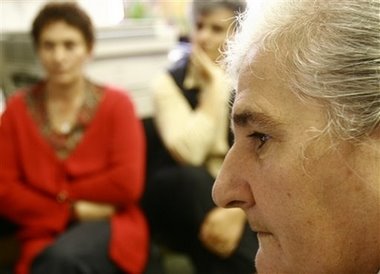
Bosniak woman Munira Subasic survivor of the Srebrenica massacre reacts as she watches on TV the verdict on Momcilo Krajisnik, a former high-ranking Bosnian Serb politician accused of genocide over the brutal campaign of ethnic cleansing during the 1992-95 war in Bosnia, at the Union of Srebrenica woman in Sarajevo on Wednesday, Sep. 27, 2006. The U.N. tribunal sentenced Bosnian Serb politician Momcilo Krajisnik on Wednesday to 27 years in prison for crimes against humanity committed during the 1992-95 Bosnian war.

Sabra Kolenovic, a Bosnian Muslim survivor of 1995 Srebrenica massacre of over 8,000 Muslims reacts, during the live TV coverage from the U.N. war crimes tribunal in the Hague, from her office in Sarajevo September 27, 2006. Relatives of victims of the Srebrenica massacre blasted the U.N. war crimes tribunal's verdict on Bosnian Serb politician Momcilo Krajisnik on Wednesday as too lenient, despite his sentence of 27 years' jail."
INTERNATIONAL WAR CRIMES TRIBUNAL JAILS FORMER BOSNIAN SERB POLITICIAN FOR 27 YEARS
“It’s a minimal punishment for what he has done,” said Zumra Sehomerovic, of the “Mothers of Srebrenica” association.“It doesn’t matter that he may not live long enough to walk out. What matters is that his acts are properly punished,” she said. “This Hague tribunal has also become a circus. God, is there justice anywhere in this world?”
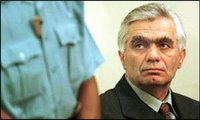 The UN Yugoslav tribunal today jailed the former speaker of the Bosnian Serb parliament for 27 years for war crimes, but acquitted him of Bosnian genocide.
The UN Yugoslav tribunal today jailed the former speaker of the Bosnian Serb parliament for 27 years for war crimes, but acquitted him of Bosnian genocide.Momcilo Krajisnik, 61, one of the highest ranking politicians in wartime Bosnia, was convicted of five counts of war crimes, including persecution, extermination, and the murder of Bosniaks and Croats in the early stages of the 1992-1995 Bosnian war, which left more than 100,000 dead on all sides, mostly Bosniaks.
Reading a litany of killings, plundering and forced transfers in a summary of the judgment, presiding judge Alphons Orie said Krajisnik’s “role in the commission of the crimes was crucial.”
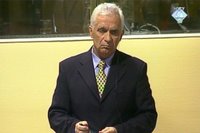 The judgment said Krajisnik “knew about, and intended, the mass detention and expulsion of civilians. He had the power to intervene, but he was not concerned with the predicament of detained and expelled persons.”
The judgment said Krajisnik “knew about, and intended, the mass detention and expulsion of civilians. He had the power to intervene, but he was not concerned with the predicament of detained and expelled persons.”Orie said the judges were unconvinced by the evidence that the Bosnian Serb leadership had deliberately intended to destroy the non-Serb population in whole or in part – a key element in winning a conviction for Bosnian genocide.
The court has ruled in other cases that genocide occurred at Srebrenica, Bosnia, in July 1995, when Bosnian Serb troops killed at least 8,000 Bosniak men and boys in the worst civilian massacre in Europe since the Second World War II (see preliminary list of dead and missing).
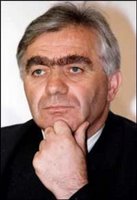 “Krajisnik wanted the Muslim [Bosniak] and Croat populations moved out of Bosnian-Serb territories in large numbers, and accepted that a heavy price of suffering, death, and destruction was necessary to achieve Serb domination and a viable statehood,” the judgment said.
“Krajisnik wanted the Muslim [Bosniak] and Croat populations moved out of Bosnian-Serb territories in large numbers, and accepted that a heavy price of suffering, death, and destruction was necessary to achieve Serb domination and a viable statehood,” the judgment said.Krajisnik listened to the reading of the verdict gravely, with downcast eyes, then stood as the sentence was read. His lawyers had asked for acquittal, and said they would appeal the ruling. Prosecutors had asked for a life sentence.
Several family members were in the gallery to hear the verdict. “I know my brother is certainly not guilty, at least not to such an extent.” said Mirko Krajisnik.
Victims of the Bosnian Serbs decried the sentence as too lenient.
“It’s a minimal punishment for what he has done,” said Zumra Sehomerovic, of the “Mothers of Srebrenica” association.
“It doesn’t matter that he may not live long enough to walk out. What matters is that his acts are properly punished,” she said. “This Hague tribunal has also become a circus. God, is there justice anywhere in this world?”
Krajisnik’s case was of the most important remaining for the tribunal, which is due to begin its last trial in 2008, and may be the last chance to apportion blame among the leadership of the breakaway Bosnian Serb leadership for atrocities carried out by troops on the ground.
The two remaining key suspects, former Bosnian Serb Radovan Karadzic and Gen. Ratko Mladic, both indicted for genocide, are fugitives.
The ruling did not mention former Yugoslav President Slobodan Milosevic, who prosecutors claimed had pulled the strings from neighbouring Serbia during the war. Milosevic died of heart attack in his cell in March, before a verdict could be rendered in his case.
A third figure in the Bosnian Serb leadership, Biljana Plavsic, confessed and is serving an 11-year sentence. She testified unwillingly against Krajisnik, saying he wielded almost as much power as Karadzic.
Krajisnik’s indictment covered events July 1991-December 2002, including the period when ethnic Serbs seized two-thirds of the territory in Bosnia and evicted non-Serbs. The judgment described what happened to Bosniak detainees at Zvornik, just one of the dozens of towns listed in the indictment.
“One man had his ear cut off, others had their fingers cut off, and at least two men were sexually mutilated,” it said. “About 160 detainees were later removed in small groups and executed by the Serb guards.”
Taken together, what was done to Bosniaks and Croats in Bosnia would be enough to constitute the act of genocide, but “the chamber has not received sufficient evidence to establish whether the perpetrators had genocidal intent,” Orie said.
The judges rejected the argument by Krajisnik’s lawyers had argued he was only a small player in the Bosnian Serb government, They said he was part of its executive authority and bore responsibility.


<< Home